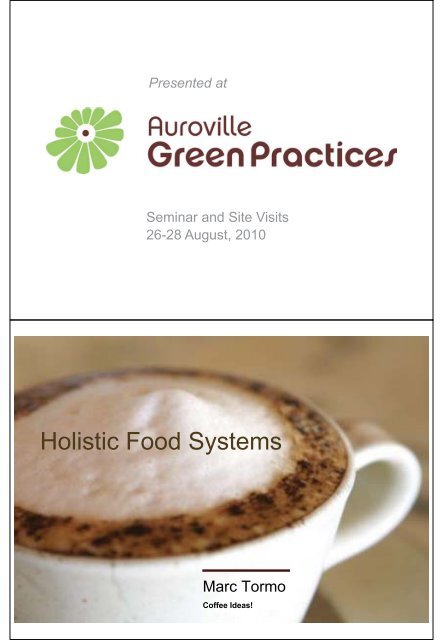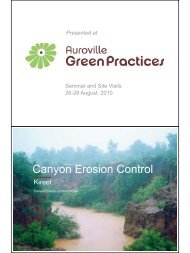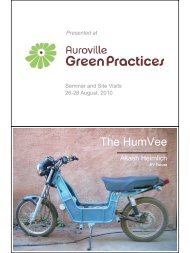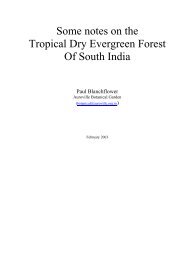Holistic Food Systems - Auroville Green Practices
Holistic Food Systems - Auroville Green Practices
Holistic Food Systems - Auroville Green Practices
- No tags were found...
You also want an ePaper? Increase the reach of your titles
YUMPU automatically turns print PDFs into web optimized ePapers that Google loves.
Presented atSeminar and Site Visits26-28 August, 2010<strong>Holistic</strong> <strong>Food</strong> <strong>Systems</strong>Marc TormoCoffee Ideas!<strong>Holistic</strong> <strong>Food</strong> <strong>Systems</strong> | Marc Tormo <strong>Auroville</strong> <strong>Green</strong> <strong>Practices</strong> Seminar 2010 1 of 20
Humanity<strong>Holistic</strong> <strong>Food</strong> <strong>Systems</strong> | Marc Tormo <strong>Auroville</strong> <strong>Green</strong> <strong>Practices</strong> Seminar 2010 2 of 20Soil Soul Society<strong>Holistic</strong> <strong>Food</strong> <strong>Systems</strong> | Marc Tormo <strong>Auroville</strong> <strong>Green</strong> <strong>Practices</strong> Seminar 2010 3 of 20
<strong>Food</strong> CirclesPrinciple of <strong>Food</strong> CirclesCommunity-based food systemBio centric approachBased on 4 principles• Ecological Wisdom• Social Justice• Grassroots Democracy• Common Values<strong>Holistic</strong> <strong>Food</strong> <strong>Systems</strong> | Marc Tormo <strong>Auroville</strong> <strong>Green</strong> <strong>Practices</strong> Seminar 2010 4 of 20Ecological WisdomSocial Justice<strong>Food</strong> is produced in harmonywith nature<strong>Food</strong> disposal is transformedinto compost<strong>Food</strong> is mostly produced locally<strong>Food</strong> is packed indegradable materialsFarmers get a fair price forthe produceConsumers & producers are unitedAll community members haveaccess to healthy food<strong>Holistic</strong> <strong>Food</strong> <strong>Systems</strong> | Marc Tormo <strong>Auroville</strong> <strong>Green</strong> <strong>Practices</strong> Seminar 2010 5 of 20
Grassroots Democracy<strong>Food</strong> security must be controlledby the community and not bytransnational organizations.Community supported agriculturedecision making processCommon ValuesAnimals that provide us food aretreated with dignity and respectMembers of the community standfor universal values: peace, equality,fraternity, creativity, beauty, gratitude,generosity, compassion....<strong>Holistic</strong> <strong>Food</strong> <strong>Systems</strong> | Marc Tormo <strong>Auroville</strong> <strong>Green</strong> <strong>Practices</strong> Seminar 2010 6 of 20Ecological Footprint Enquiry• How are the vegetables I eat grown?• How is the meat I eat produced?• Why do I eat?Agriculture and HusbandryEnquiry• How much land do I need to sustain mydaily diet?• How much land I am eligible to use today?• How can I minimize the impact on theenvironment?• How many miles does my food travel?• How much garbage do I generate?• What can I do with my garbage?<strong>Holistic</strong> <strong>Food</strong> <strong>Systems</strong> | Marc Tormo <strong>Auroville</strong> <strong>Green</strong> <strong>Practices</strong> Seminar 2010 7 of 20
<strong>Food</strong> Processing Enquiry• How fresh is the food I eat?• What are artificial food additives?• What are the effects on my health?• What are the effects on the planet?<strong>Holistic</strong> <strong>Food</strong> <strong>Systems</strong> | Marc Tormo <strong>Auroville</strong> <strong>Green</strong> <strong>Practices</strong> Seminar 2010 8 of 20<strong>Food</strong> and Farming in the 21st CenturyUn-sustainable eating and farming habitsSustainable eating and farming habits<strong>Food</strong> is processed<strong>Food</strong> is packed<strong>Food</strong> travels many milesEating higher on food chain is lesssustainableConventional farming is energyintensiveLarge farms and mono culture isunsustainableConsumer and producer areseparate<strong>Food</strong> is fresh and whole<strong>Food</strong> is sold without packaging<strong>Food</strong> eaten grows locallyWhole food plant based diet ismost sustainable.Organic farming does not wasteenergy or waterSmall farms with multiple crops aremore sustainableConsumer and producer are united<strong>Holistic</strong> <strong>Food</strong> <strong>Systems</strong> | Marc Tormo <strong>Auroville</strong> <strong>Green</strong> <strong>Practices</strong> Seminar 2010 9 of 20
Example: <strong>Holistic</strong> Coffee System<strong>Holistic</strong> <strong>Food</strong> <strong>Systems</strong> | Marc Tormo <strong>Auroville</strong> <strong>Green</strong> <strong>Practices</strong> Seminar 2010 10 of 20The Ecology of Coffee• Coffee in India grows in the forest• Co-exists with the indigenous faunaand flora• Inter cropped with spices and fruits,under controlled shade of large timbertrees• Soil is rich with moist hummus• Coffee cultivation preventsdeforestation and Mono crop industrialagriculture (i.e.: coconut oil)• Act as a carbon off-setting agent<strong>Holistic</strong> <strong>Food</strong> <strong>Systems</strong> | Marc Tormo <strong>Auroville</strong> <strong>Green</strong> <strong>Practices</strong> Seminar 2010 11 of 20
<strong>Holistic</strong> <strong>Food</strong> <strong>Systems</strong> | Marc Tormo <strong>Auroville</strong> <strong>Green</strong> <strong>Practices</strong> Seminar 2010 12 of 20Your Coffee Foot Print• If you drink one coffee a day afarmer must maintain 9 coffeeplants to meet your demand!!• 9 coffee plants occupy 180square meter of forest: What agreat reason to have a secondcup a day! We cannot say thesame about tea!<strong>Holistic</strong> <strong>Food</strong> <strong>Systems</strong> | Marc Tormo <strong>Auroville</strong> <strong>Green</strong> <strong>Practices</strong> Seminar 2010 13 of 20
<strong>Holistic</strong> <strong>Food</strong> <strong>Systems</strong> | Marc Tormo <strong>Auroville</strong> <strong>Green</strong> <strong>Practices</strong> Seminar 2010 14 of 20The Economy of CoffeeCoffee is the second most tradedcommodity after oilMost of the profit goes away from theproducing countriesPrices fixed by the future marketsand not based on real productioncostsIndustrial coffee cultivation saturatesoffer over demand, at the cost of lowprices and qualityFree trade versus Fair Trade<strong>Holistic</strong> <strong>Food</strong> <strong>Systems</strong> | Marc Tormo <strong>Auroville</strong> <strong>Green</strong> <strong>Practices</strong> Seminar 2010 15 of 20
How Ethical is your Coffee?Enjoy the coffee moment and reflect…Who are the people behind the cup?Do you want to know more?<strong>Holistic</strong> <strong>Food</strong> <strong>Systems</strong> | Marc Tormo <strong>Auroville</strong> <strong>Green</strong> <strong>Practices</strong> Seminar 2010 16 of 20The Sociology of Coffee• Coffee has become the socialdrink of the 21st Century• Café culture spreading fast• Coffee shops as social platforms<strong>Holistic</strong> <strong>Food</strong> <strong>Systems</strong> | Marc Tormo <strong>Auroville</strong> <strong>Green</strong> <strong>Practices</strong> Seminar 2010 17 of 20
<strong>Holistic</strong> <strong>Food</strong> <strong>Systems</strong> | Marc Tormo <strong>Auroville</strong> <strong>Green</strong> <strong>Practices</strong> Seminar 2010 18 of 20<strong>Holistic</strong> <strong>Food</strong> <strong>Systems</strong>Marc TormoCoffee Ideas!Contact:CoffeeIdeascoffeeideas@auroville.org.inwww.coffeeideas.in<strong>Holistic</strong> <strong>Food</strong> <strong>Systems</strong> | Marc Tormo <strong>Auroville</strong> <strong>Green</strong> <strong>Practices</strong> Seminar 2010 19 of 20
green.aurovilleportal.org
















